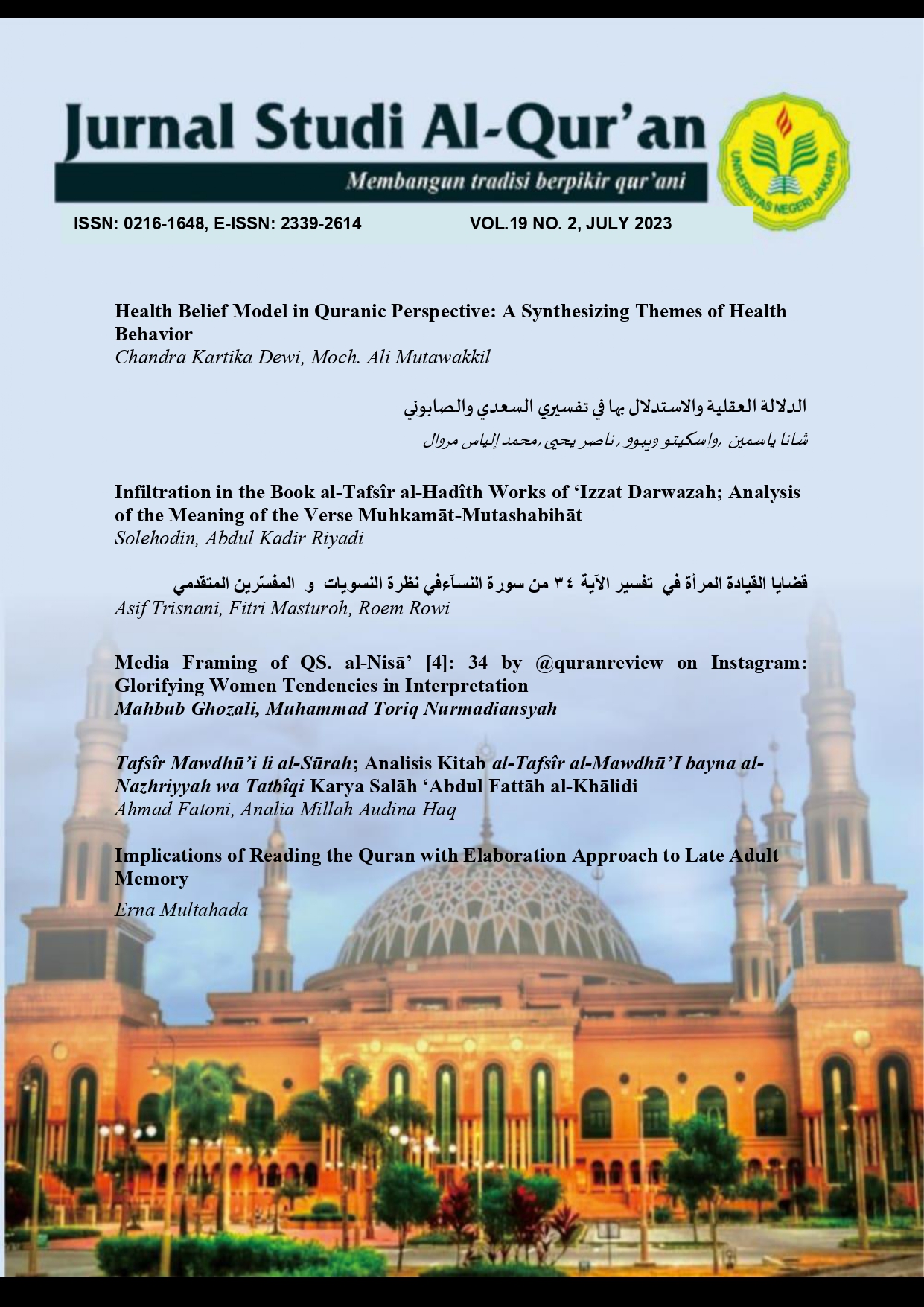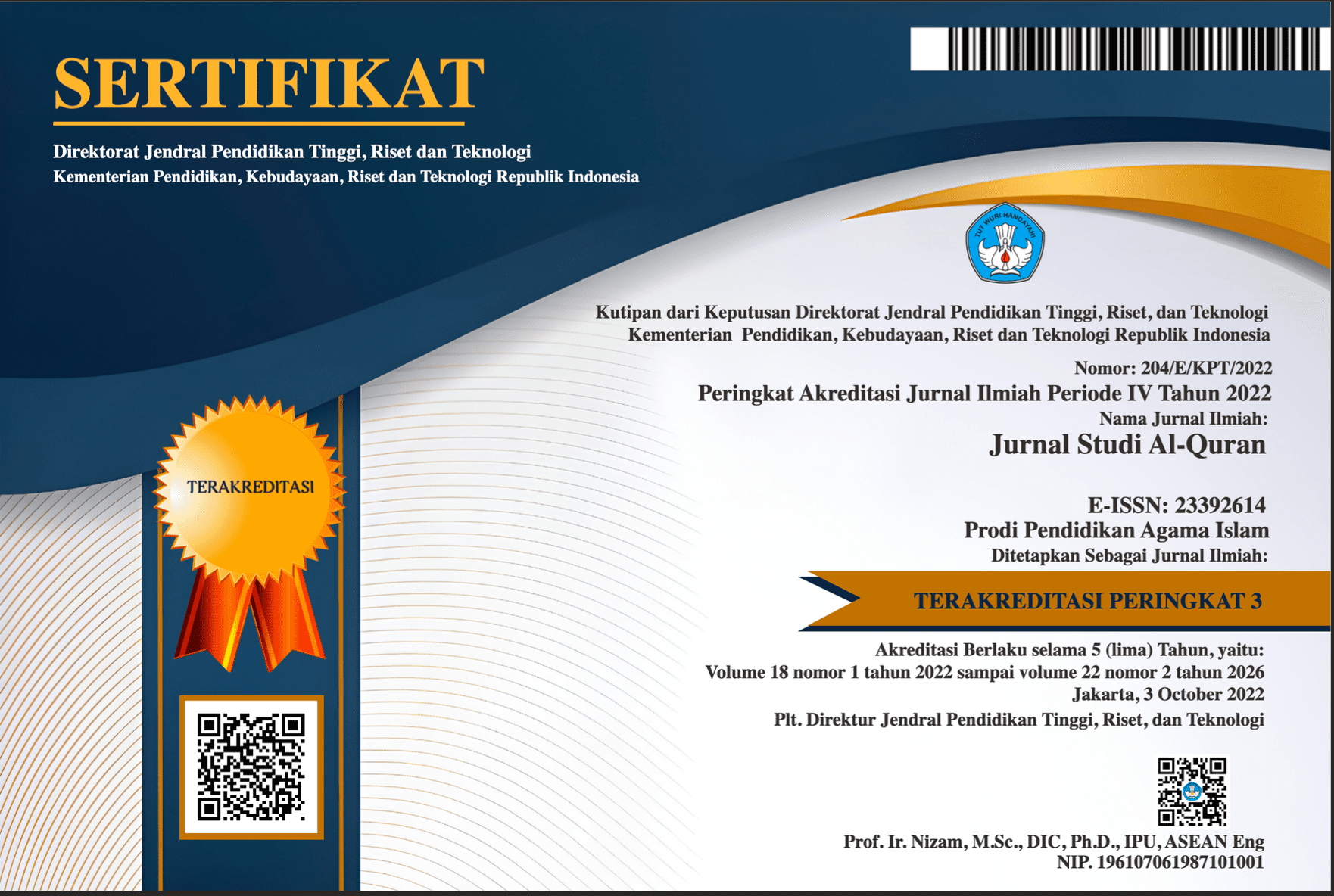Implications of Reading the Qur’ān with an Elaboration Approach to Older Adult’s Memory
DOI:
https://doi.org/10.21009/JSQ.019.2.07Keywords:
Reading Al-Qur’ān, Elaboration, Older Adult, MemoryAbstract
This study aims to determine the implications of reading the Al-Qur’ān with an elaboration approach to older adult memory. Participant N = 42 (aged 55-78 years). Participants were obtained using a purposive technique at the Majlis Ta’lim X. This study uses a quasi-experimental approach with a discontinuity regression design. Reading the Al-Qur’ān with an elaboration approach is used to 1) understand the meaning of the verses of the Al-Qur’ān and 2) learn the science of Tahsin and tajwid. The al-Qur’ān reading questionnaire using interactive theory was made to find the implications of reading Al-Qur’ān with elaboration and memory questionnaires applying two-factor theory and recognition. The study results show implications for reading the Al-Qur’ān with an elaboration approach to late adult memory at Majlis Ta’lim X. In conclusion, there are implications for reading the Al-Qur’ān with an elaboration approach to late adult memory at Majlis Ta’lim X.
References
B. R. Bonder and V. Dal Bello-Haas, Functional performance in older adults: FA Davis, 2009.
Bartsch, L.M & Oberauer, K., 2020). The Effects of Elaboration on Working Memory and Long TermMemory Across Age. Department of Psychology: University of Zurich
D. A. R. Indonesia, Al Qur’ān dan Terjemah.
Djiwatampu, M.L., Indasari, D.T., Respati, A. (2004). Melihat dan Mengingat. Jakarta: Fakultas Psikologi Universitas Indonesia
Effendi, M. R., Khoerunnisa, I., & Syaprudin, D. (2021, November). Improving the Ability to Read the Qur'an Through Qiro'ati Method. In Proceeding International Conference on Islam and Civilization (ICONIC) (Vol. 1, No. 1, pp. 319-330).
Eggen, P.D., & Kauchack, D.P., 2016. Educational Psychology for Windows on Classrooms. Tenth Edition. England: Pearson
Einstein. O.G., Smith, R.E., Daniel. MA, & Show.P. 1997. Ageing and Prospective Memory: The Influence of Increased Task Demands at Encoding and Retrieval. Psychology and Aging. Vol. 11. No. 3. 479-488.
Foster, J.K., 2010. Psikologi Memori Menyikap Rahasia Memori. Publisher: Portico
Feldman O.P., 2009. Human Development; Perkembangan Manusia. Jakarta: Salemba Humanika. Edisi 10. Buku 2
G. O. Einstein, Memory fitness: A guide for successful ageing: Yale University Press, 2004.
Galotti, K.M. (2008). Cognitive Psychology; In and Out of Laboratory. 4th Edition. USA: Thompson Wadsworth
J. I. Campbell and N. Charness, “Age-related declines in working-memory skills: Evidence from a complex calculation task,” Developmental Psychology, vol. 26, p. 879, 1990.
L. L. Light, E. M. Zelinski, and M. Moore, “Adult age differences in reasoning from new information,” Journal of Experimental Psychology: Learning, Memory, and Cognition, vol. 8, p. 435, 1982.;
Makhdlori M. 2008. Mukjizat-mukjizat Membaca Al-Qur’ān ; Membedah Sisi-sisi Keutamaan Membaca Al-Qur’ān terhadap Kehidupan Anda di Dunia dan Akhirat. Yogyakarta: DIVA Press. Cetakan Pertama
Nurpratiwi, S., Amaliyah, A., Hakam, A., & Romli, N. A. (2022, January). Pemberdayaan Kemampuan ICT Guru untuk Pembelajaran Daring Melalui Pendampingan Penyusunan Bahan Ajar Digital Berbasis Web. In PROSIDING SEMINAR NASIONAL PENGABDIAN KEPADA MASYARAKAT UNIVERSITAS NAHDLATUL ULAMA SURABAYA (Vol. 1, No. 1, pp. 153-162).
P. W. Foos, “Adult age differences in working memory,” Psychology and Aging, vol. 4, p. 269, 1989.
Pabichara., K. 2010. Rahasia Melatih Daya Ingat; Cara Revolusioner Meningkatkan Kecerdasan Otak dalam Waktu Sekejap. Cetakan -1. Jakarta: Kayla Pustaka
Papalia, E. D., Old, S.W., Feldman, R.D., 2008. Human Development; Perkembangan Manusia. Jakarta: Salemba Humanika. Bagian V s/d IX. Edisi 9. Buku 2. Cet. 1. Jakarta
Pinel, J.P.L. 2009. Biopsikologi. Edisi Ketujuh. Yogyakarta: Pustaka Pelajar
Ramadlan, A. Ust. 1987. Tarjamah Duratun Nasihin. Surabaya: Mahkota.
Rankin dan Collins (dalam Bartsch, L.M & Oberauer, K., 2020; Eggen & Kauchack, 2016; Einstein & McDaniel., 2004)
Saifullah, I., Fitri, N. H. N., & Fatonah, N. (2022). Pengaruh Pelaksanaan Metode Tikrar Terhadap Hafalan Al-Quran Peserta Didik. Paedagogie: Jurnal Pendidikan dan studi Islam, 3(02), 149-165.
Saquib, N., Saquib, J, Alhadlag, A, Albakour, M.A, Bader Aljumah1, Mohammed Sughayyir1, Alhomidan, Z., Alminderej, O., Mohamed Aljaser, M., Al-Dhlawiy, A.M, dan Abdulrahman Al-Mazrou, A. 2017. Health Benefits Of Qur’ān Memorization For Older Men. DOI: 10.1177/2050312117740990. journals.sagepub.com/home/smo.
S. L. Connelly, L. Hasher, and R. T. Zacks, “Age and reading: the impact of distraction,” Psychology and ageing, vol. 6, p. 533, 1991.
Stenberg. JR (2009). Psikologi Kognitif. Edisi Keempat. Yogyakarta: Pustaka Pelajar
T. A. Salthouse and R. L. Babcock, “Decomposing adult age differences in working memory,” Developmental psychology, vol. 27, p. 763, 1991.
Downloads
Published
How to Cite
Issue
Section
License
Authors who publish with this Journal agree to the following terms:
- Author retain copyright and grant the journal right of first publication with the work simultaneously licensed under a creative commons attribution licensethat allow others to share the work within an acknowledgement of the work’s authorship and initial publication of this journal.
- Authors are able to enter into separate, additional contractual arrangementfor the non-exclusive distribution of the journal’s published version of the work (e.g. acknowledgement of its initial publication in this journal).
- Authors are permitted and encouraged to post their work online(e.g. in institutional repositories or on their websites) prior to and during the submission process, as it can lead to productive exchanges, as well as earlier and greater citation of published works.
Users/public use of this website will be licensed to CC BY










